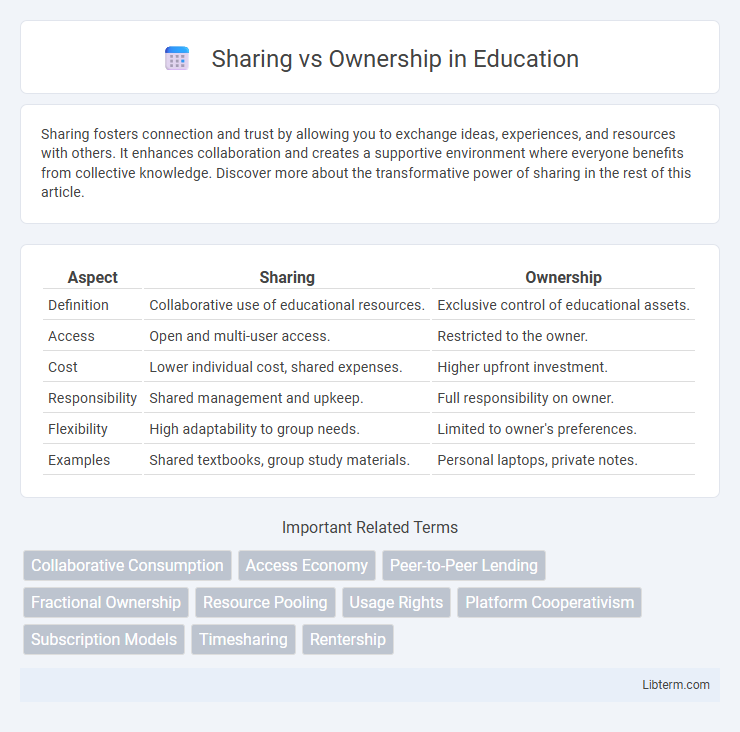Sharing fosters connection and trust by allowing you to exchange ideas, experiences, and resources with others. It enhances collaboration and creates a supportive environment where everyone benefits from collective knowledge. Discover more about the transformative power of sharing in the rest of this article.
Table of Comparison
| Aspect | Sharing | Ownership |
|---|---|---|
| Definition | Collaborative use of educational resources. | Exclusive control of educational assets. |
| Access | Open and multi-user access. | Restricted to the owner. |
| Cost | Lower individual cost, shared expenses. | Higher upfront investment. |
| Responsibility | Shared management and upkeep. | Full responsibility on owner. |
| Flexibility | High adaptability to group needs. | Limited to owner's preferences. |
| Examples | Shared textbooks, group study materials. | Personal laptops, private notes. |
Introduction to Sharing vs Ownership
Sharing involves the joint use or access to resources, services, or goods without transferring full rights, promoting collaboration and resource efficiency. Ownership grants exclusive rights and control over an asset, providing legal authority and responsibility to the owner. Understanding the distinction between sharing and ownership is crucial for optimizing resource management and fostering sustainable consumption behaviors.
Historical Evolution of Ownership
Ownership has evolved from communal sharing in prehistoric societies to individualized property rights codified in legal systems throughout history. Early agricultural communities transitioned from collective resource management to private land ownership, driven by economic development and social stratification. Modern legal frameworks emphasize individual ownership rights, reflecting changes in economic complexity and cultural values over time.
The Rise of the Sharing Economy
The rise of the sharing economy revolutionizes traditional ownership models by enabling access over possession, reducing costs and maximizing resource efficiency through platforms like Airbnb and Uber. This shift promotes a collaborative consumption mindset where goods and services are shared, rented, or borrowed, rather than individually owned. Market data reveals the global sharing economy is projected to reach $335 billion by 2025, highlighting growing consumer preference for flexible, sustainable alternatives to ownership.
Economic Impacts of Sharing Models
Sharing models reduce costs by maximizing asset utilization and lowering the need for individual ownership, stimulating economic efficiency. These models can disrupt traditional industries by shifting consumer behavior from possession to access, impacting sales and revenue streams. Increased sharing leads to job creation in platform management and maintenance, though it may challenge conventional employment structures and regulatory frameworks.
Environmental Benefits of Sharing
Sharing resources reduces the demand for new products, leading to lower raw material extraction and energy consumption. This decrease in production results in reduced greenhouse gas emissions and less waste generation, contributing positively to environmental sustainability. Collaborative consumption encourages efficient use of existing assets, minimizing environmental footprints and promoting circular economy principles.
Psychological Aspects of Ownership
Psychological aspects of ownership deeply influence personal identity and emotional attachment, often creating a sense of control, security, and responsibility over possessions. Sharing can challenge this sense of ownership, leading to potential conflicts or feelings of loss but also fostering trust and social bonding. Understanding these psychological dynamics helps explain why individuals may resist sharing despite practical benefits.
Technology’s Role in Facilitating Sharing
Technology has revolutionized sharing economies by enabling seamless access to digital platforms that connect users with shared resources, such as ride-sharing apps and peer-to-peer rental services. Cloud computing and blockchain enhance trust and transparency, facilitating secure, decentralized transactions without traditional ownership constraints. These innovations reduce costs, increase efficiency, and promote sustainable consumption by shifting focus from possession to access.
Social Implications of Collaborative Consumption
Collaborative consumption challenges traditional ownership models by promoting access over possession, fostering community engagement and reducing environmental impact through resource sharing. This shift encourages social equity as individuals from diverse backgrounds can access goods and services otherwise unaffordable. However, it also raises concerns about regulatory gaps, privacy, and the erosion of traditional economic roles.
Legal Challenges: Sharing vs Ownership
Legal challenges in sharing arrangements often arise from unclear property rights and contractual ambiguities, leading to disputes over usage, liability, and profit distribution. Ownership provides definitive legal control but can involve complex compliance requirements and increased responsibility for damages or losses. Courts frequently address conflicts by interpreting shared agreements versus ownership rights, emphasizing the necessity of explicit terms to prevent litigation.
Future Trends in Sharing and Ownership
Future trends in sharing versus ownership indicate a growing preference for shared economy models, driven by advancements in digital platforms and increased environmental awareness. Emerging technologies such as blockchain and IoT enhance trust and transparency in asset sharing, facilitating more efficient use of resources. Consumer behavior is shifting toward access over possession, with sectors like transportation, housing, and consumer electronics increasingly adopting subscription-based and peer-to-peer sharing frameworks.
Sharing Infographic

 libterm.com
libterm.com